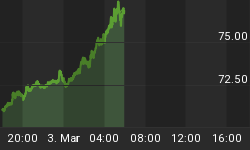Proclaiming a gold bubble has been the mainstream financial media's Pavlovian response to every incremental increase made by the yellow metal since it emerged from a two decade low in 2001. Appreciating an astounding 400%+ in USD's from its bottom, gold has handily outperformed all major asset classes over the past 10 years. Importantly, this achievement was attained without the support of, nay, despite relentless negative coverage by mainstream financial pundits and highly esteemed economic academics.
Cockeyed thinking in the conventional camp.
Conventional thought concludes that gold must be overvalued, since it has appreciated so forcefully against the professionally managed dollar (and all other central bank controlled fiat currencies) the past 10 years. The basic premise supporting this thinking is fundamentally and fatally flawed. The foundation for this belief lies in a blind devotion to the idea that the US dollar, cast as ultimate and omnipotent medium of exchange, has achieved a state of permanence. In reality, such a position could only be ascribed to a medium of exchange far less vulnerable to the misguided policies of error prone men. Further, this myopic US dollar centric mindset demonstrates a dangerous lack of appreciation for history.
Not a 70's gold bull replay.
True, gold's last bull run gave way to 20 years of price erosion, ratcheting down to the lowly exchange rate of $255 per ounce. Regardless, the US and global economic landscape of 2010 is vastly different than that of 1980. Today's exponential growth of sovereign debt is straining confidence in faith based currencies, particularly one which holds the mantle of world's reserve currency. This current debt differentiator, in conjunction with a myriad of other issues inhibiting US economic growth, is substantial enough to reasonably assure investors of a strikingly different course and conclusion to this gold bull.
Observations from a natural resources expert.
Striving to keep my ideas in check, I seek to consult with others tasked with understanding the global financial markets. As such, I posed the basic question of whether the gold price is in bubble territory to Tom Winmill, president and portfolio manager of the Midas Fund (www.MidasFunds.com). Tom's response; "Whether gold is in a bubble depends on your currency point of view. In Zimbabwe dollars, definitely not. In Chinese renminbi? Maybe. In U.S. dollars? That's what at Midas we call the 62 trillion dollar question. Sixty-two trillion dollars is the approximate amount that some, including David Walker who served as the U.S. Comptroller General from 1998 to 2008 , estimate is the total debt of the United States in explicit obligations and unfunded promises. The question then becomes is "how is the United States ever going to deal with this unimaginably huge sum?"
Exploding debt and politically expedient solutions.
Strip away all the trappings, and the US dollar quandary is easy to understand. Huge debt, growing debt, and no politically feasible way to resolve it. With history as a guide, and political attitudes as they are, the road ahead for the dollar is somewhat predictable. More debt and more dollars, which should be supportive of gold's ongoing long term price assent, followed by US debt saturation and dollar repudiation, potentially sending gold prices parabolic.
The chart below provides a good illustration of the accelerating national debt. Similar acts of financial self destruction were simultaneously performed by a large swath of individual households in tandem with state and local government. Note the irony in regard to the close time proximity whereby national debt accumulation began its aggressive ascent and gold commenced its 20 year odyssey in the financial wilderness. As the debt seeds were being sown, gold was squelched by investors heeding the siren song of "this time it's different, debt doesn't matter." Of course it doesn't matter, until it does. Come 2001, gold ceased to remain mum on the soon to emerge global financial crisis and resumed its role as financial early warning system.
Greenspan comes clean on gold and fiat currency.
Speaking to the Council on Foreign Relations on September 15, 2010, Alan Greenspan advised central bankers that they should be paying attention to the price of gold. "It signals problems with respect to currency markets, " said Greenspan. "Central banks should pay attention to it."
Responding to a query by the Council as to the forces driving the price of gold, the former Fed Chairman replied, "Fiat money has no place to go but gold," as reported by economist David Malpass in The New York Sun. Malpass further noted that Greenspan admitted to thinking a lot about gold prices over the years and decided the supply and demand explanations treating gold like other commodities "simply don't pan out." Greenspan's conclusion, as characterized by Malpass, "gold is simply different."
Conclusion
Gold bubble or debt bubble leading to currency crisis?
If blind allegiance is pledged to a faith based currency, and unswerving trust is bestowed upon its guardians, than gold must appear to be trading at absurd levels. Conversely, if the actions of the Fed, Treasury, and Congress continue as they have, and no credible indication to the contrary has been remotely telegraphed yet, than history may prove the most astute forecaster. In such an environment, gold may not only not be in a bubble, but in the preliminary stages of a monumental bull market leading to the unthinkable. And the last point may be that when priced in future dollars, as when measured in Zimbabwe dollars or Weimer Republic Mark notes, whatever price level gold ascends to could be a point of permanence.
















